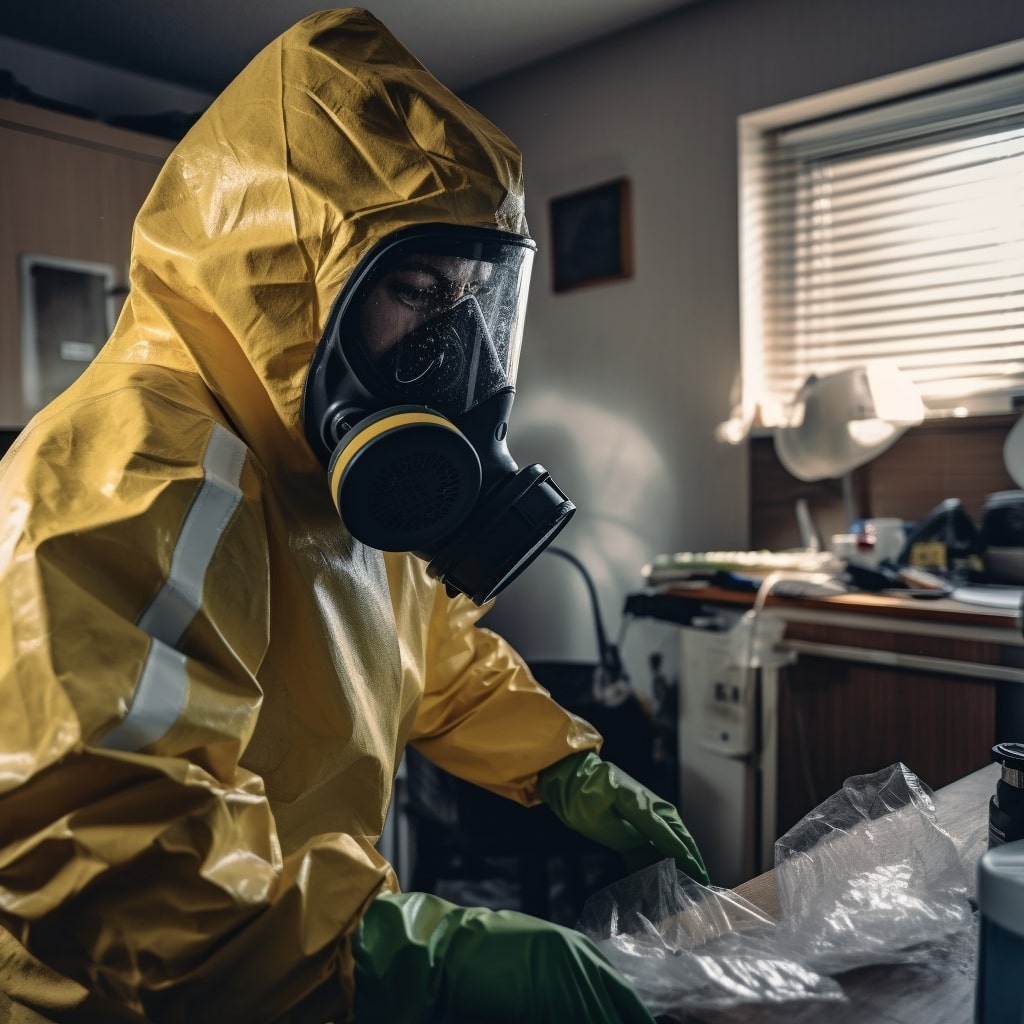The process of crime scene and biohazard cleanup can have significant emotional implications for those involved. Witnessing the aftermath of a crime scene or dealing with biohazardous materials can result in profound psychological distress, including anxiety, fear, grief, sadness, and even post-traumatic stress disorder (PTSD).
This article aims to shed light on the deep emotional effects of crime scene and biohazard cleanup, emphasizing the importance of professional cleanup services in minimizing the emotional burden on individuals while ensuring effective and efficient cleaning.
The Psychological Toll of Crime Scene Cleanup
In light of the current discussion on the psychological toll of crime scene cleanup, it is imperative to acknowledge the immediate and long-term emotional ramifications experienced by those involved in this challenging and traumatic profession.
Psychological resilience plays a crucial role in coping with the emotional well-being during cleanup. Trauma and recovery are integral aspects of biohazard cleanup, and support systems are vital for the well-being of cleanup professionals.
Mindfulness techniques can also aid in coping with the stress associated with cleanup.
Understanding the Emotional Impact of Biohazard Cleanup
The emotional toll experienced by individuals involved in biohazard cleanup is a significant concern that must be addressed with utmost care and attention.
Psychological well-being, trauma recovery, emotional resilience, coping mechanisms, and support systems are key factors in managing the emotional impact of this challenging work.
Professionals in this field face unique challenges that can affect their mental health. It is crucial to provide resources and support to ensure their psychological well-being and aid in their trauma recovery process.
Coping With Anxiety and Fear in Crime Scene and Biohazard Cleanup
Professionals engaged in crime scene and biohazard cleanup often grapple with recurring anxiety and fear as they confront the distressing realities of their work. Managing stress and seeking help are crucial for their emotional resilience. Coping strategies and self-care play a vital role in maintaining their mental well-being.
It is important for these professionals to understand the profound emotional effects of their work and to have access to resources that can support them in dealing with anxiety and fear.
Post-Traumatic Stress Disorder: A Hidden Consequence of Cleanup
Exposure to traumatic events during crime scene and biohazard cleanup can result in the development of post-traumatic stress disorder (PTSD), which poses a hidden consequence that individuals in this line of work should be aware of and address promptly.
Treatment options for PTSD are crucial for individuals to regain their mental well-being.
The long-term effects of trauma can have a profound impact on a person’s life, affecting their relationships, work, and overall quality of life.
Self-care strategies for coping, such as seeking therapy, practicing mindfulness, and engaging in hobbies, can help individuals manage their symptoms and prevent further distress.
Supporting loved ones after exposure involves providing a safe and understanding environment, offering emotional support, and encouraging professional help if needed.
Early intervention is key in preventing the worsening of symptoms and improving the chances of recovery.
Compassion Fatigue: the Emotional Strain of Dealing With Biohazards
In the challenging field of crime scene and biohazard cleanup, professionals often experience compassion fatigue due to the overwhelming emotional strain involved in dealing with biohazards.
This emotional strain can lead to anxiety, difficulty coping, and even consequences such as post-traumatic stress disorder (PTSD).
It is crucial for these professionals to have access to emotional support and resources to prevent or manage these issues.
Providing adequate emotional support is essential for maintaining their mental well-being and ensuring effective cleanup processes.
The Importance of Emotional Support in Crime Scene and Biohazard Cleanup
Seeking emotional support and establishing strong connections are crucial for individuals involved in crime scene and biohazard cleanup to effectively cope with the psychological toll of their work. The importance of counseling, support networks, and self-care techniques cannot be overstated. These elements provide the necessary tools for individuals to process their experiences and heal from trauma.
Additionally, trauma therapy and emotional resilience training play a vital role in helping individuals develop the emotional resilience needed to continue their important work in a healthy and sustainable manner. These specialized forms of therapy and training focus on addressing the unique challenges and stressors faced by crime scene and biohazard cleanup professionals.
Depression and PTSD: Recognizing the Signs After Exposure
Recognizing the signs of depression and PTSD is crucial for individuals who have been exposed to traumatic events such as crime scenes or biohazard cleanup, as it allows for timely intervention and appropriate support.
Recognizing triggers, such as grief, loss, and stress, is essential in identifying the potential development of these mental health conditions.
Seeking treatment is vital for those experiencing emotional detachment, intense thoughts, and psychological distress.
The importance of support cannot be overstated in helping individuals cope with the profound emotional effects of such experiences.
The Vital Role of Professional Cleanup in Addressing Emotional Effects
How can professional cleanup companies effectively address the emotional effects of traumatic events such as crime scenes and biohazard cleanup?
Professional expertise: Trained professionals can provide a sense of reassurance and competence, alleviating anxiety and fear.
Emotional well-being: Emotional support and understanding are crucial for individuals affected by trauma, promoting healing and resilience.
Trauma recovery: Cleanup companies can collaborate with mental health professionals to ensure a comprehensive approach to trauma recovery.
Support network: Connecting individuals with support groups and resources can foster a sense of belonging and empowerment.
Effective coping strategies: Providing guidance on self-care and coping techniques can equip individuals with tools to navigate the emotional aftermath.
Conclusion
In conclusion, crime scene and biohazard cleanup can have profound emotional effects on individuals involved. The witnessing of traumatic scenes and exposure to biohazardous materials can lead to anxiety, fear, grief, and even post-traumatic stress disorder. Emotional support and professional help are crucial for effectively coping with these emotional burdens.
Additionally, those involved in the cleanup process may experience compassion fatigue and feelings of disgust. Prioritizing emotional support and self-care is important for maintaining mental well-being in this challenging field.

